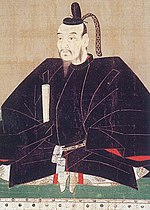List of Cultural Properties of Japan - paintings (Kōchi)
This list is of paintings designated in the category of paintings (絵画, kaiga) for the Prefecture of Kōchi, Japan.[1]
National Cultural Properties[edit]
As of 1 July 2019, two Important Cultural Properties have been designated, being of national significance.[2][3]
| Property | Date | Municipality | Ownership | Comments | Image | Dimensions | Coordinates | Ref. |
|---|---|---|---|---|---|---|---|---|
| Chōsokabe Motochika, colours on silk 絹本著色長宗我部元親像 kenpon chakushoku Chōsokabe Motochika zō |
1599 | Kōchi | Hada Jinja (秦神社) (kept at Kōchi Prefectural Museum of History) |
1 scroll[4] |  |
105.2 centimetres (3 ft 5.4 in) by 54.5 centimetres (1 ft 9.5 in) | 33°35′46″N 133°37′24″E / 33.596069°N 133.623447°E | [1] |
| Fugen Enmei, colours on silk 絹本著色普賢延命像 kenpon chakushoku Fugen Enmei zō |
late Kamakura period | Kōchi | Ryūjō-in (龍乗院) | 1 scroll; with twenty arms and riding on four elephants[5] |  |
107.0 centimetres (3 ft 6.1 in) by 56.2 centimetres (1 ft 10.1 in) | 33°34′13″N 133°33′04″E / 33.570327°N 133.551178°E | [2] |
Prefectural Cultural Properties[edit]
As of 1 May 2019, six properties have been designated at a prefectural level.[6][7]
| Property | Date | Municipality | Ownership | Comments | Image | Dimensions | Coordinates | Ref. |
|---|---|---|---|---|---|---|---|---|
| Paintings at Yōhō-ji 要法寺の画像 Yōhōji no gazō |
Muromachi and Edo period | Kōchi | Yōhō-ji (要法寺) | designation comprises five scrolls: (1) Yamauchi Yasutoyo, colours on paper (紙本著色山内康豊画像, shihon chakushoku Yamauchi Yasutoyo gazō); (2) Jisenin, colours on silk (絹本著色慈仙院画像, kenpon chakushoku Jisenin gazō); (3) Etenin, colours on silk (絹本著色恵沾院画像, kenpon chakushoku Etenin gazō); (4) Thirty Guardian Deities, colours on paper (紙本著色三十番神画像, shihon chakushoku Yamauchi Yasutoyo gazō); and (5) Kishimojin, colours on paper (紙本著色鬼子母神画像, shihon chakushoku Kishimojin gazō); (4) & (5) date to the Muromachi period and (1), (2), & (3) to the Edo period[8] |    |
(1) 90.8 centimetres (2 ft 11.7 in) by 44.3 centimetres (1 ft 5.4 in); (2) 77.7 centimetres (2 ft 6.6 in) by 33.5 centimetres (1 ft 1.2 in); (3) 86.0 centimetres (2 ft 9.9 in) by 34.9 centimetres (1 ft 1.7 in); (4) 70.8 centimetres (2 ft 3.9 in) by 38.0 centimetres (1 ft 3.0 in); and (5) 65.7 centimetres (2 ft 1.9 in) by 25.9 centimetres (10.2 in) | 33°33′11″N 133°32′14″E / 33.553073°N 133.537123°E | [3] |
| Buddhist Paintings at Kongōchō-ji 金剛頂寺の仏画 Kongōchōji no butsuga |
Muroto | Kongōchō-ji (金剛頂寺) | designation comprises eight scrolls: (1) Jizō Bosatsu, colours on silk (絹本著色地蔵菩薩像, kenpon chakushoku Jizō Bosatsu zō); (2) Kokūzō Bosatsu, colours on silk (絹本著色虚空蔵菩薩像, kenpon chakushoku Kokūzō Bosatsu zō); (3) Nirvana painting, colours on silk (絹本著色仏涅槃図, kenpon chakushoku Butsu nehan zu); (4) Monju Bosatsu with Hair in Five Knots, colours on silk (絹本著色五髻文殊菩薩像, kenpon chakushoku go motodori Monju Bosatsu zō); (5) Ryōzu Aizen Mandala, colours on silk (絹本著色両頭愛染曼荼羅図, kenpon chakushoku Ryōzu Aizen mandala zu); (6) Aizen Myōō, colours on silk (絹本著色愛染明王像, kenpon chakushoku Aizen Myōō zō); (7) Aji, embroidered silk (絹本刺繍阿字図, kenpon shishū Aji zu); (8) Shaka with Sixteen Benevolent Deities, colours on silk (絹本著色釈迦十六善神像, kenpon chakushoku Shaka jūroku zenjin zō); Kongōchō-ji is Temple 26 on the Shikoku 88 Temple Pilgrimage |   |
33°18′26″N 134°07′23″E / 33.307236°N 134.122982°E | [4] | ||
| Mandala of the Two Realms, colours on silk 絹本著色両界曼陀羅 kenpon chakushoku ryōkai mandara |
Nankoku | Tosa Kokubun-ji (土佐国分寺) | Tosa Kokubun-ji is Temple 29 on the Shikoku 88 Temple Pilgrimage | 33°35′55″N 133°38′26″E / 33.598696°N 133.640431°E | [5] | |||
| Deeds of Kōya Daishi, colours on paper 紙本著色高野大師行状図画 shihon chakushoku Kōya Daishi kōjō zuga |
1416 | Tosashimizu | Kongōfuku-ji | five emakimono; copies of the ten-scroll 1319 original; Kongōfuku-ji is Temple 38 on the Shikoku 88 Temple Pilgrimage[9] |  |
32°43′34″N 133°01′07″E / 32.726010°N 133.018566°E | [6] | |
| Thirty Guardian Deities, at Shinjō-ji, ita-e 真静寺三十番神板絵 Shinjōji sanjū banshin ita-e |
Shimanto | Shinjō-ji (真静寺) | 3 wooden boards[10] | 32°57′49″N 132°49′45″E / 32.963595°N 132.829041°E | [7] | |||
| Former Akaoka Town Byōbu Tosa Scenes of Kabuki 旧赤岡町の土佐芝居絵屏風 kyū-Akaoka-chō no Tosa shibai-e byōbu |
C19 | Kōnan | Ekin Museum | twenty-three two-fold screens by Hirose Kinzō (1812-1876), also known as Ekin; displayed annually at the Ekin Festival[11][12] |  |
33°32′30″N 133°43′28″E / 33.541757°N 133.724470°E | [8] |
See also[edit]
- Cultural Properties of Japan
- List of National Treasures of Japan (paintings)
- Japanese painting
- List of Historic Sites of Japan (Kōchi)
- List of Cultural Properties of Japan - historical materials (Kōchi)
References[edit]
- ^ "Cultural Properties for Future Generations". Agency for Cultural Affairs. Retrieved 20 August 2019.
- ^ 国宝・重要文化財 [Number of National Treasures and Important Cultural Properties by Prefecture] (in Japanese). Agency for Cultural Affairs. 1 July 2019. Retrieved 20 August 2019.
- ^ "Database of National Cultural Properties: 国宝・重要文化財(美術品)(絵画 高知県)" (in Japanese). Agency for Cultural Affairs. Archived from the original on 30 June 2019. Retrieved 20 August 2019.
- ^ 絹本著色長宗我部元親像 [Chōsokabe Motochika, colours on silk] (in Japanese). Kōchi Prefecture. Retrieved 29 September 2013.
- ^ 絹本著色普賢延命像 [Fugen Enmei, colours on silk] (in Japanese). Kōchi Prefecture. Retrieved 29 September 2013.
- ^ 高知県の国及び県指定等文化財件数一覧表 [Number of National and Prefectural Cultural Properties in Kōchi Prefecture] (in Japanese). Kōchi Prefecture. 26 March 2014. Retrieved 20 August 2019.
- ^ 都道府県別指定等文化財件数(都道府県分) [Number of Prefectural Cultural Properties by Prefecture] (in Japanese). Agency for Cultural Affairs. 1 May 2019. Retrieved 20 August 2019.
- ^ "文化財情報 有形文化財 絵画 要法寺の画像" [Paintings at Yōhōji]. Kōchi City. 23 December 2008. Retrieved 1 October 2013.
- ^ 紙本著色高野大師行状図画 [Deeds of Kōya Daishi, colours on paper] (in Japanese). Tosashimizu City. Archived from the original on 4 October 2013. Retrieved 3 October 2013.
- ^ 高知県保護有形文化財の指定 [Kochi Cultural Property Protection] (in Japanese). Kōchi Prefecture. Retrieved 3 October 2013.
- ^ "Ekin Museum and Festival". Kōchi Prefecture. Retrieved 29 September 2013.
- ^ Parent, Mary. "kabuki-e". Japanese Architecture and Art Net Users System. Retrieved 1 October 2013.
External links[edit]
- (in Japanese) Cultural Properties in Kōchi Prefecture

